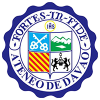Final Paper Template
PARTS OF A RESEARCH PROPOSAL
TITLE
The first part of a research proposal is the title. A good title should reflect the content, problems and/or the main variable(s) of the study. It has to be brief, concise and clear. It should give an idea as to what the whole problem is about – a description, a comparison, a relation or an evaluation of a certain phenomenon or topic.
INTRODUCTION
Spell out the peculiarity of the situation or research problem you are interested in investigating. This introduction should build up into focus the main question or the research problem at hand, i.e., how the research problem came about. The introduction should also tell us about the research gap that the study wants to fill up.
The Introduction also includes the review of literature and conceptual framework, if needed. A brief summary of the findings of pertinent previous studies on the problem, and the status of current research; and the additional knowledge needed to which the project is expected to contribute. This review should be done to put together materials for the formulation of a conceptual framework, which is best illustrated by a diagram which shows the relationships of all the study variables.
PROBLEM/OBJECTIVES
A good research problem/objective has the following characteristics:
- It should be specific
- It should be relevant to the times
- It should be practical
- It should fill a research gap
SIGNIFICANCE OF THE STUDY
This section presents the reasons for doing the work – such as the needs the project will fill and why the work should be done now. It could also deal with defining the contributions which the research findings can give to its end users – people, agency, region or even nation who are going to make use of the research findings.
METHODOLOGY
The proposed plans and methods should correspond to the objectives of the research study. The research methodology must include the following :
- Design. It must be appropriate to the requirements of the research problem.
- Respondents. The respondents of the study are identified in this section. They are the subjects of the survey or interview or participants of the focus group discussion.
- Sampling Design. The sample size is discussed in this section, and together with it the process by which the sample size was derived.
- Instrumentation. The research instruments used for data collection will be presented here. The components of the questionnaire, interview schedule, focus group discussion, guide, etc. would be made explicit.
- Plan of Analysis. This section will indicate how exactly all the information obtained in the research instruments will be used and analyzed. It is suggested that for beginners, dummy tables be prepared indicating the variables to be studied.
TIME TABLE.
The schedule of activities of the research is presented here in a Gantt Chart.
BUDGET.
BIBLIOGRAPHY/REFERENCES.
Research Chair Program
For more inquiries, or visit us in the URO office!
- University Research Office - ADZU
- 991-0871 local 1200
- uro@adzu.edu.ph



